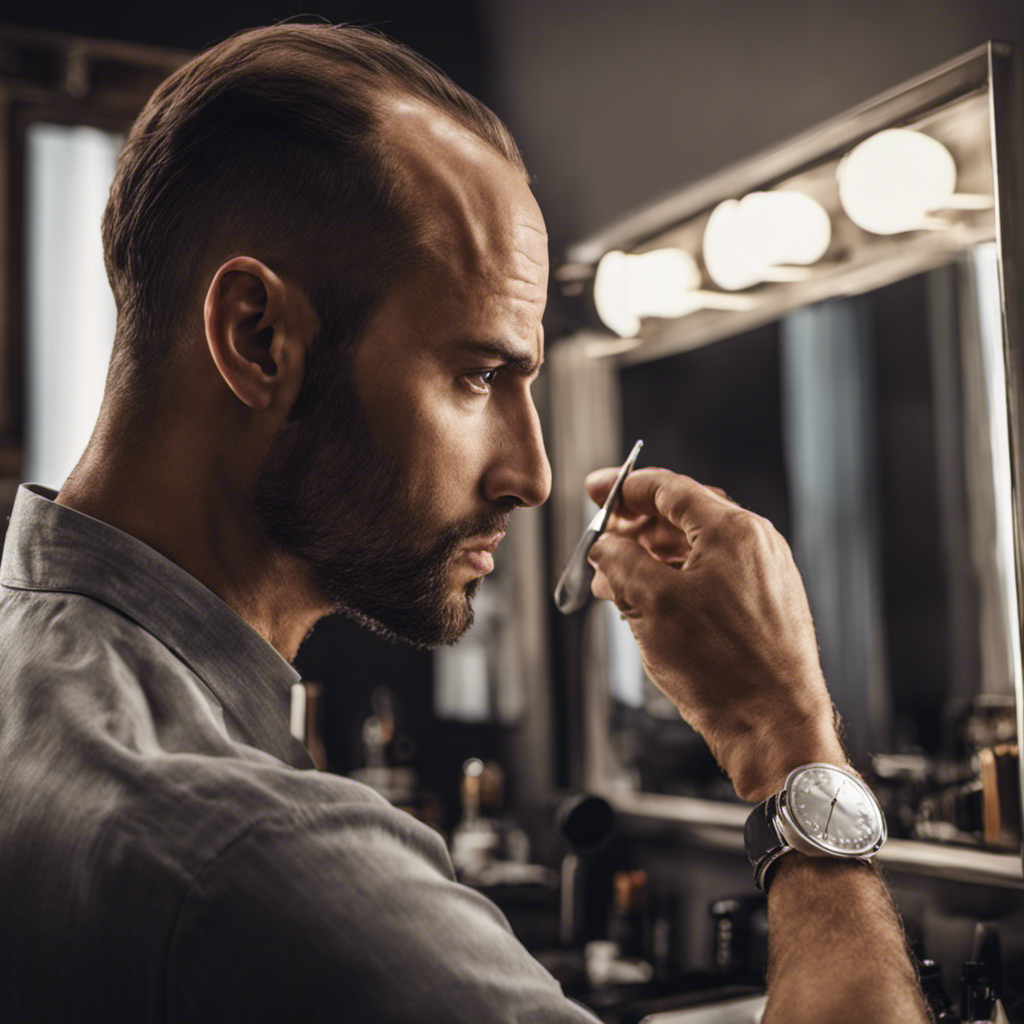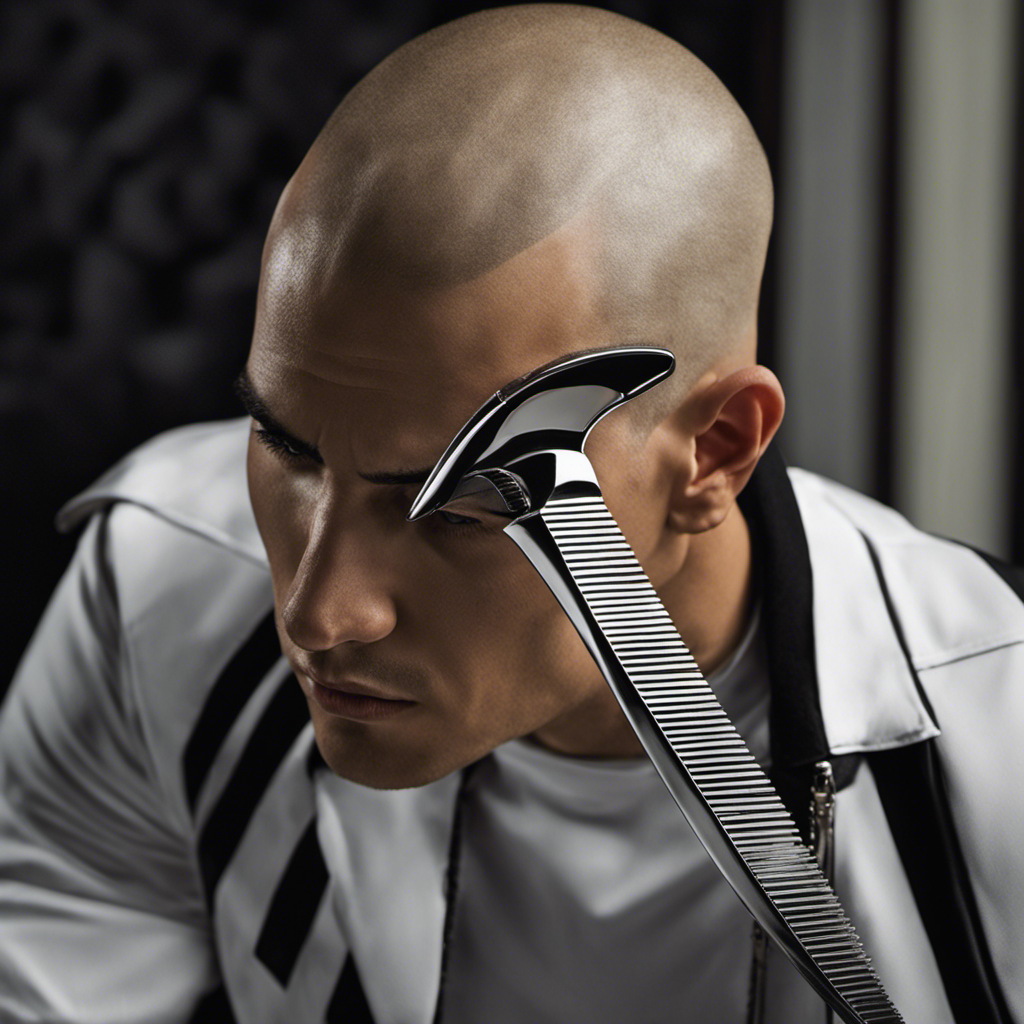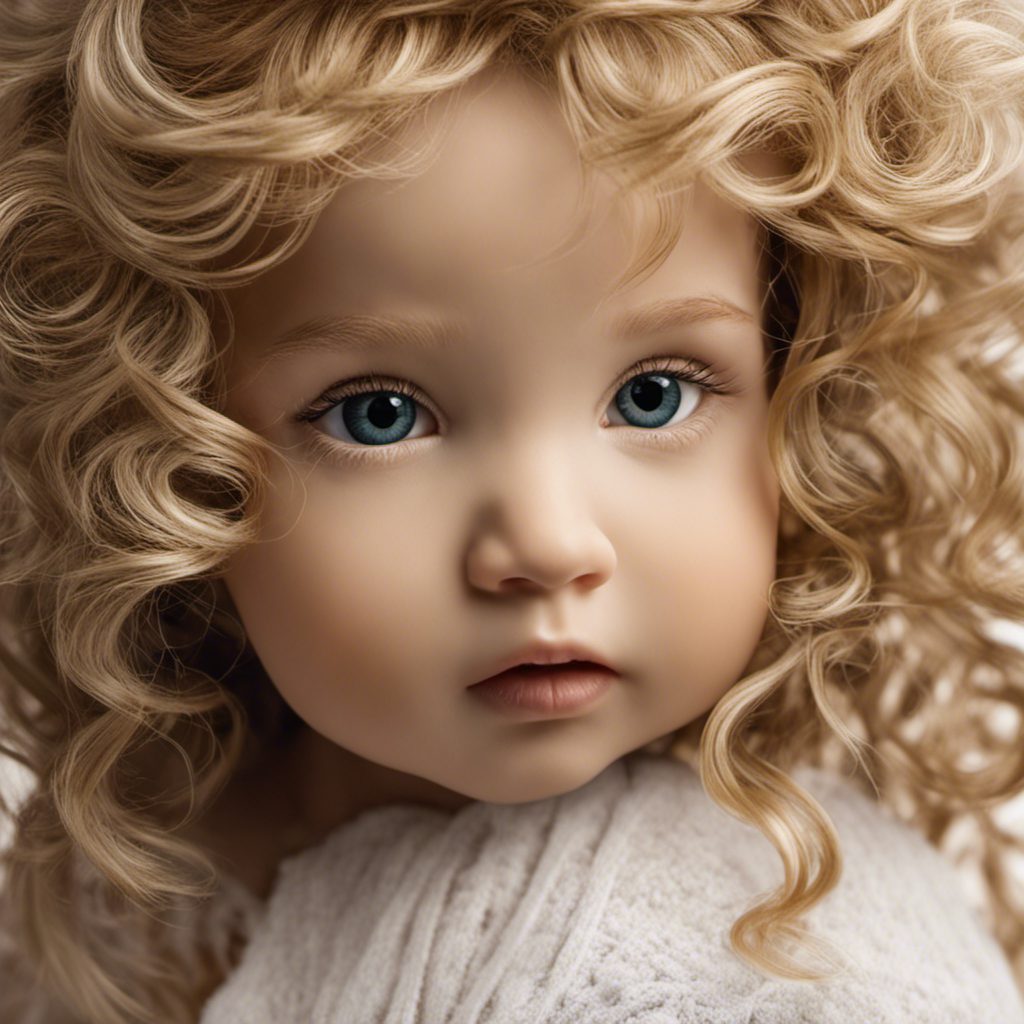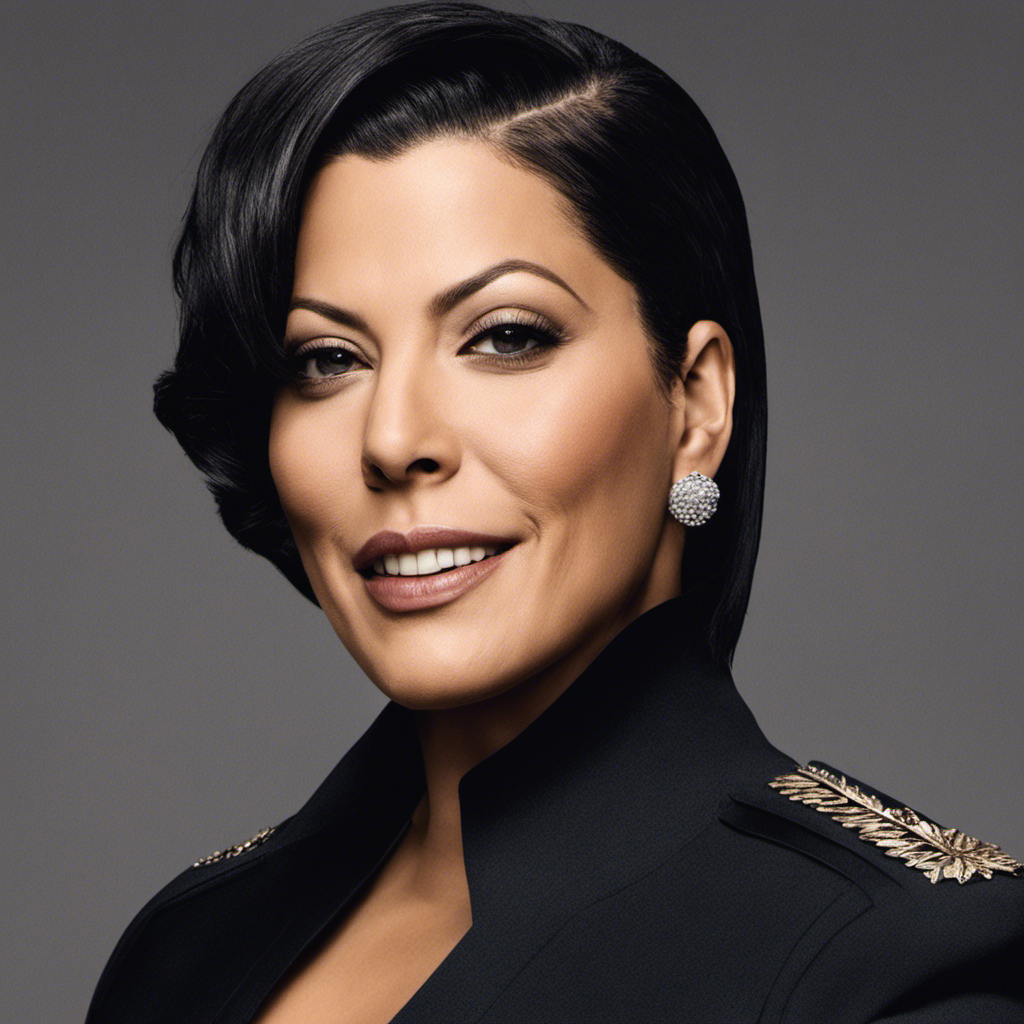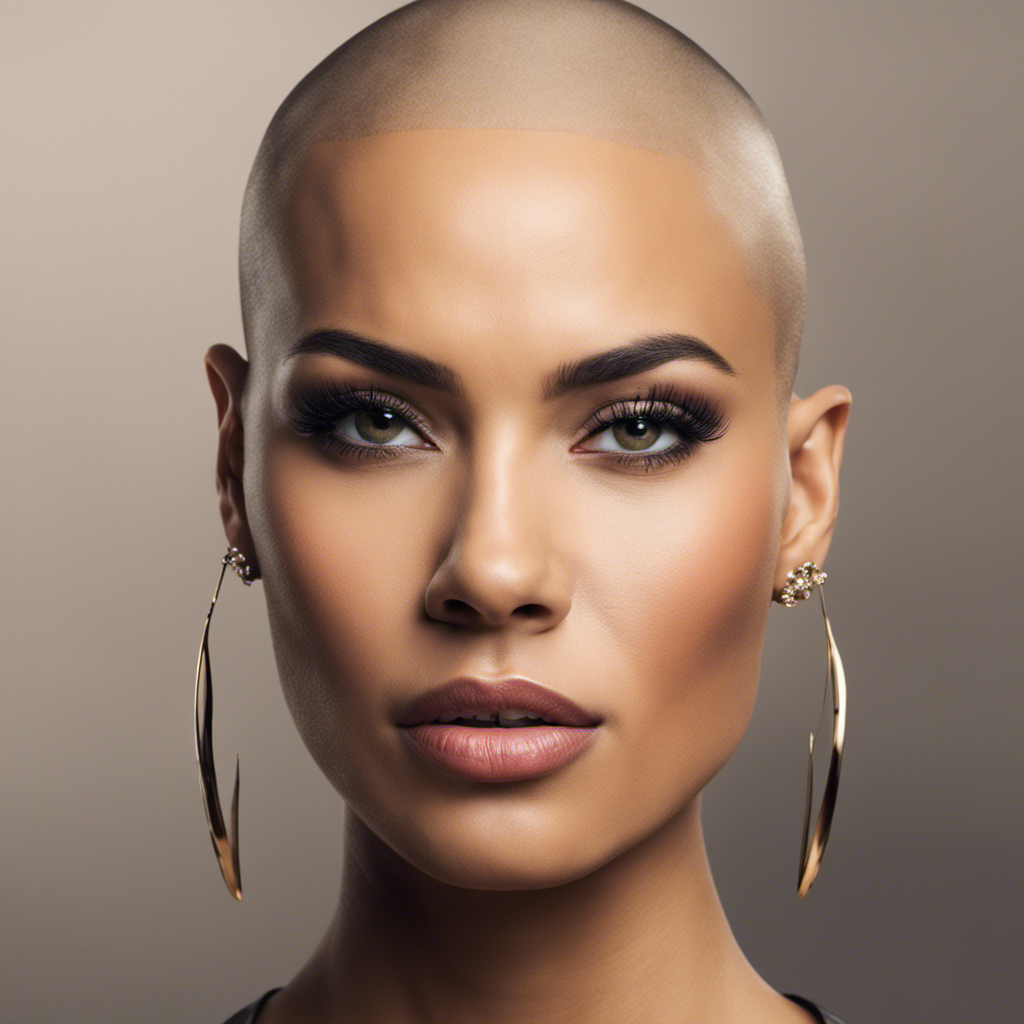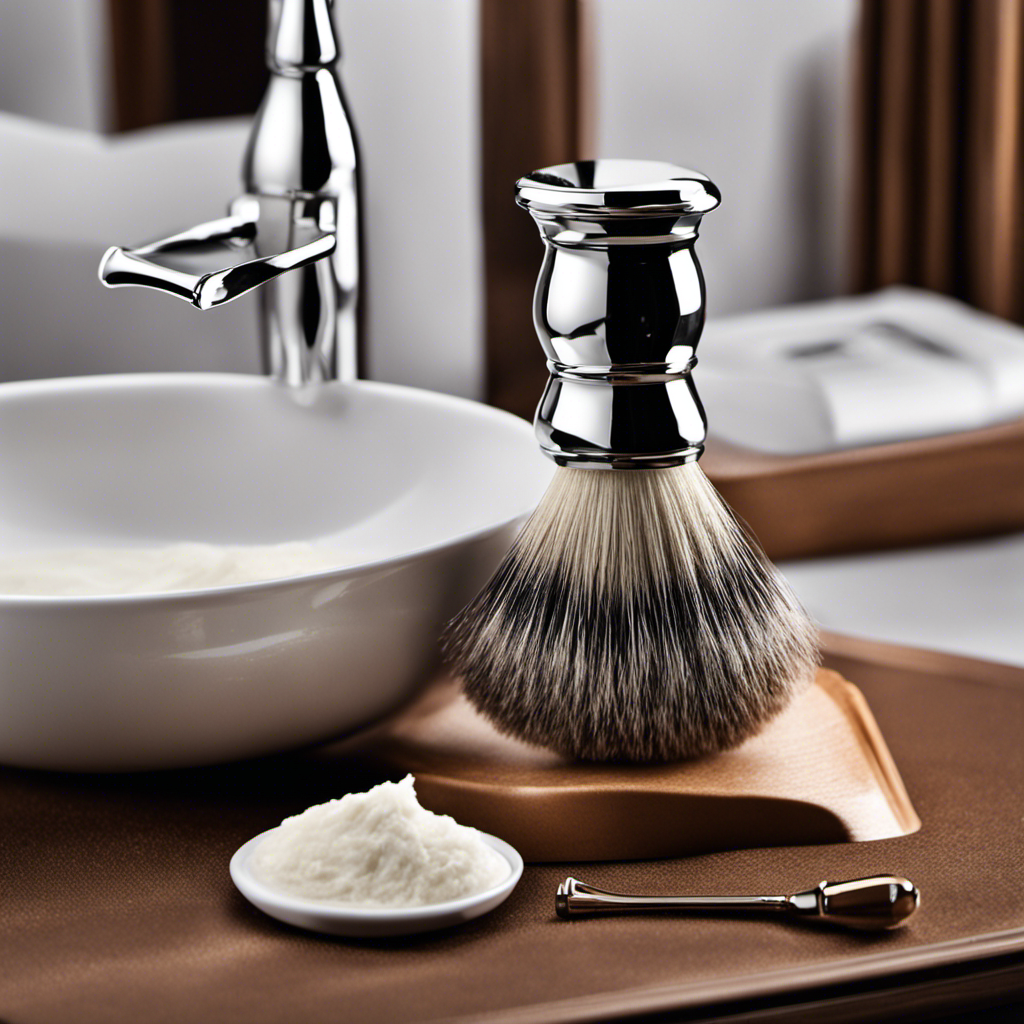Guides and Tutorials
Why Do You Have to Shave Your Head if You Have Cancer
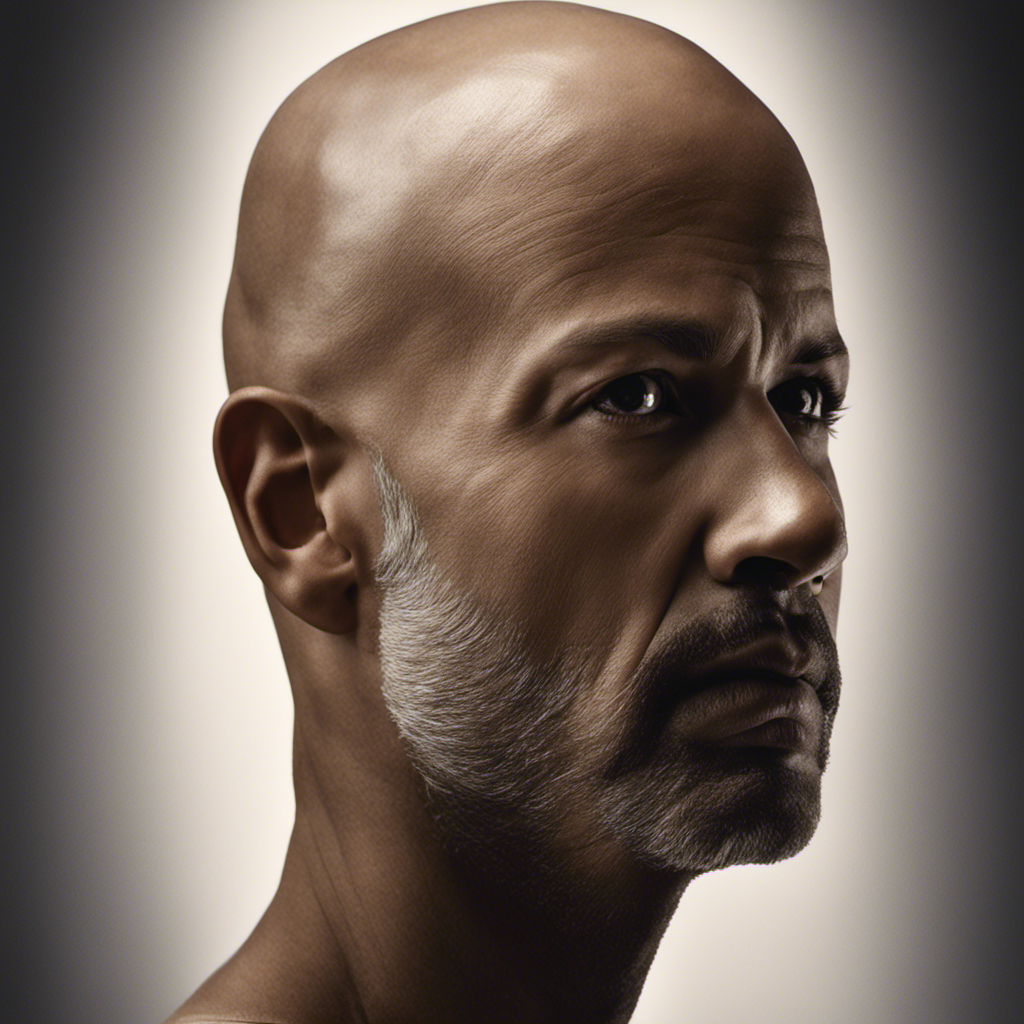
Having gone through the tough battle against cancer myself, I know firsthand how tough losing your hair can be on your heart and mind.
Did you know that approximately 65% of cancer patients will experience hair loss due to chemotherapy?
In this article, we will delve into the reasons behind the necessity of shaving one’s head during cancer treatment, exploring the symbolic significance, social challenges, and practical solutions to help navigate this difficult journey with resilience and confidence.
Key Takeaways
- Hair loss during cancer treatment can lead to feelings of self-consciousness and vulnerability, as society places importance on appearance.
- Empathy and support are crucial in helping individuals navigate the emotional challenges of hair loss during cancer treatment.
- Hair loss can have a significant impact on an individual’s self-esteem and feelings of adequacy, especially for those who strongly identify with their cultural heritage.
- Understanding the emotional and psychological impact of hair loss is essential in providing holistic support and promoting emotional well-being.
The Psychological Impact of Hair Loss
Losing your hair can have a significant emotional impact on individuals undergoing cancer treatment. It’s not just about the physical change; it’s also about the psychological toll it takes. Understanding the stigma and societal pressures associated with hair loss is crucial in providing support to those going through this difficult experience.
Hair loss can be a visible reminder of one’s illness, making individuals feel self-conscious and vulnerable. Society often places a great deal of importance on appearance, and losing hair can lead to feelings of shame and embarrassment. The fear of being judged or treated differently can be overwhelming.
Empathy and compassion are essential in helping individuals navigate the emotional challenges of hair loss. Providing a safe space for them to express their feelings and offering support can make a world of difference. It’s important to remember that hair loss is a temporary side effect of cancer treatment, and there are ways to cope and regain a sense of confidence.
Understanding the psychological impact of hair loss is just the first step. Next, we will delve into understanding chemotherapy and its role in causing hair loss.
Understanding Chemotherapy and Hair Loss
Hair loss can be caused by a variety of factors, including genetics, hormonal changes, and certain medical conditions.
This can have a significant emotional impact on patients, as losing one’s hair is often associated with a loss of identity and self-esteem.
However, there are ways to cope with baldness, such as wearing wigs, using medications, or embracing a bald look with confidence.
Hair Loss Causes
When chemotherapy is administered, it often causes the body to stop producing new hair. This is because the powerful drugs used in chemotherapy target rapidly dividing cells, including the cells responsible for hair growth.
However, it’s important to note that hair loss is not solely caused by chemotherapy. There are other underlying conditions and hormonal factors that can contribute to hair loss in cancer patients. Here are three key factors to consider:
-
Underlying conditions: Certain medical conditions, such as autoimmune disorders or thyroid problems, can lead to hair loss. These conditions may be present before the cancer diagnosis and can exacerbate hair loss during chemotherapy.
-
Hormonal factors: Hormonal imbalances, such as those caused by menopause or certain medications, can also contribute to hair loss. Chemotherapy can further disrupt hormonal balance, leading to more severe hair loss.
-
Genetic predisposition: Some individuals may have a genetic predisposition to hair loss, which can be exacerbated by chemotherapy. This means that even without cancer treatment, these individuals may experience hair loss due to their genetic makeup.
Understanding the various causes of hair loss during chemotherapy is crucial in providing support and guidance to cancer patients. By addressing these underlying conditions and hormonal factors, healthcare professionals can help manage and minimize hair loss during treatment.
Emotional Impact on Patients
During chemotherapy, it’s common to experience a range of emotions as you navigate the challenges of cancer treatment. The emotional impact on patients can be immense, as they face not only the physical toll of the disease, but also the psychological and social effects. It’s important to recognize and address these emotions, as they can greatly influence the overall well-being of the patient.
I have found that counseling services can be incredibly beneficial during this time. These services provide a safe space to express fears, anxieties, and concerns, and can help patients develop coping strategies. Additionally, hair loss support groups can offer a sense of community and understanding, as they connect individuals who are going through similar experiences.
To illustrate the importance of emotional support, here is a table showcasing the various emotions that patients may experience during chemotherapy, and how counseling services and hair loss support groups can help:
| Emotions | Counseling Services | Hair Loss Support Groups |
|---|---|---|
| Fear | Provide coping mechanisms and tools to manage anxiety | Offer empathy and understanding from others who have experienced hair loss |
| Sadness | Assist in processing grief and loss | Provide a sense of community and support |
| Isolation | Offer a safe and non-judgmental space to share feelings | Connect patients with others facing similar challenges |
Coping With Baldness?
Coping with baldness can be challenging for cancer patients, but there are resources available to help navigate this aspect of their treatment journey. Losing one’s hair can have a significant impact on self-esteem and body image, making it important to explore coping strategies and self-esteem boosters.
Here are three effective ways to navigate baldness during cancer treatment:
-
Support Groups: Joining a support group can provide a safe space to share experiences and emotions with others who are going through a similar journey. Connecting with others facing similar challenges can help alleviate feelings of isolation and provide valuable coping strategies.
-
Head Coverings: Wearing head coverings, such as scarves, hats, or wigs, can help boost self-esteem and provide a sense of normalcy. Experimenting with different styles and colors can be empowering, allowing patients to express their individuality and regain some control over their appearance.
-
Self-Care Practices: Engaging in self-care activities like gentle scalp massages, moisturizing the scalp, or trying out soothing hair masks can help promote a positive self-image and enhance overall well-being. Taking care of oneself physically and emotionally is crucial during this challenging time.
Hair Loss as a Symbol of Strength and Resilience
Losing one’s hair can have a profound emotional impact. It affects not only one’s physical appearance but also their self-esteem and sense of identity. Hair holds cultural significance in many societies. It symbolizes beauty, vitality, and femininity or masculinity.
However, embracing hair loss can also be empowering. It allows individuals to redefine beauty standards and find strength in their resilience and inner qualities.
Emotional Impact of Baldness
Having a bald head due to cancer treatment can be emotionally challenging, but remember that it’s just a temporary change and your hair will eventually grow back. As someone who has experienced this myself, I understand the emotional impact it can have on one’s sense of identity.
However, there are coping strategies that can help navigate this difficult period and aid in rebuilding your identity:
-
Seek support: Reach out to friends, family, or support groups who can provide understanding and empathy during this time. Sharing your feelings and experiences can provide a sense of validation and comfort.
-
Embrace alternative styles: Experiment with different head coverings, such as scarves, hats, or wigs, that allow you to express your personal style while giving a temporary solution to the physical changes.
-
Practice self-care: Engage in activities that promote self-care and boost your self-esteem. This could include exercise, meditation, or pursuing hobbies that bring you joy and a sense of accomplishment.
Cultural Significance of Hair
The emotional impact of baldness is undeniably profound, as we discussed earlier. However, it is important to recognize that the cultural significance of hair plays a significant role in how we perceive ourselves and others. Hair has long been associated with beauty, youth, and vitality in many cultures around the world. Its absence can lead to a loss of self-esteem and a feeling of inadequacy.
Hair loss can be particularly challenging for individuals who identify strongly with their cultural heritage. Hair styles and grooming practices often hold deep cultural significance, and losing one’s hair can feel like losing an important part of their identity. This can further amplify the emotional distress associated with hair loss.
Understanding the cultural significance of hair is crucial in providing holistic support to individuals experiencing hair loss. By acknowledging and addressing the emotional and psychological impact of hair loss, we can help foster a sense of self-acceptance and promote emotional well-being during this challenging time.
Empowering Through Hair Loss
Embracing your baldness can be a powerful way to reclaim your sense of self and inspire others who may be going through a similar experience. Losing one’s hair, whether due to cancer treatment or other reasons, can be a challenging and emotional journey. However, there are ways to find empowerment and beauty in baldness.
Here are three key ways:
-
Self-expression: Going bald allows you to explore and embrace different aspects of your personality. You can experiment with different hats, scarves, or even tattoo your scalp, using it as a canvas for self-expression.
-
Inner strength: By embracing your baldness, you are showing the world your resilience and inner strength. It takes courage to defy societal norms and embrace your natural appearance, inspiring others to do the same.
-
Community support: Baldness can create a sense of camaraderie among individuals who have experienced hair loss. Sharing your journey and connecting with others who understand can provide a valuable support network, helping you navigate the challenges and find beauty in baldness.
Embracing your baldness is an empowering act of self-expression, allowing you to find beauty in the face of hair loss. It is a journey that can inspire others, fostering a sense of community and inner strength.
Managing Social Stigma and Judgments
Dealing with social stigma and judgments can be challenging for cancer patients who choose to shave their heads. When faced with the physical changes that come with cancer treatment, managing self-esteem becomes crucial.
Society often places immense pressure on individuals to conform to certain beauty standards, and this can exacerbate the already difficult journey of a cancer patient. The loss of hair is a visible reminder of the illness, which can lead to feelings of self-consciousness and vulnerability.
However, it is important to remember that beauty is not solely defined by external appearances. Society’s expectations should not dictate how we perceive ourselves during this challenging time. Instead, we can focus on finding inner strength and resilience, recognizing that our true beauty lies within.
Exploring Alternative Hair Options
Exploring alternative hair options can be an empowering way to regain a sense of control and enhance self-esteem for cancer patients. When faced with hair loss due to cancer treatment, it’s important to consider the variety of hair alternatives available.
Here are three wig options that can provide a natural look and feel:
-
Human hair wigs: These wigs are made from real human hair, offering the most realistic appearance and texture.
-
Synthetic wigs: These wigs are made from synthetic fibers and are more affordable than human hair wigs. They come in a wide range of styles and colors.
-
Lace front wigs: These wigs feature a sheer lace front that creates a natural-looking hairline, making them a popular choice among cancer patients.
Exploring these wig options can help cancer patients find a hair alternative that suits their preferences and boosts their confidence.
As we move forward to discuss maintaining scalp health during treatment, it’s important to remember that caring for one’s scalp is crucial for overall hair health and regrowth.
Maintaining Scalp Health During Treatment
While undergoing cancer treatment, it’s essential to prioritize maintaining a healthy scalp to support hair health and regrowth. The effects of cancer treatment on the scalp can be challenging, but there are scalp care tips that can help alleviate some of these issues.
First and foremost, it’s crucial to keep the scalp clean and moisturized. Using a gentle shampoo and conditioner can prevent dryness and irritation. Additionally, avoiding heat styling tools and harsh chemicals can help protect the scalp and promote hair regrowth.
It’s also important to protect the scalp from the sun by wearing a hat or using sunscreen. These scalp care tips can contribute to a healthier environment for hair regrowth during and after cancer treatment.
Moving forward, let’s explore supportive resources for coping with hair loss.
Supportive Resources for Coping With Hair Loss
Finding supportive resources can greatly assist individuals in coping with hair loss during cancer treatment. There are several options available that can provide emotional and practical support during this challenging time.
-
Cancer Support Groups: Joining a support group can help individuals connect with others who are going through similar experiences. These groups provide a safe space to share feelings, concerns, and advice, and can offer a sense of community and understanding.
-
Wig Options: Wigs can be a great option for those who want to maintain a sense of normalcy during treatment. There are a variety of wig options available, including synthetic wigs that are affordable and easy to maintain, as well as human hair wigs that offer a more natural look and feel.
-
Counseling Services: Seeking professional counseling can be beneficial for individuals struggling with the emotional impact of hair loss. Therapists can provide guidance and support, helping individuals navigate the complex emotions that can arise during cancer treatment.
Embracing Your New Look: Self-Acceptance and Confidence
Embrace your new look and cultivate self-acceptance and confidence in the midst of hair loss during cancer treatment.
It’s important to acknowledge the emotional impact that hair loss can have on individuals undergoing chemotherapy or radiation therapy. Self-care practices play a crucial role in building self-esteem during this challenging time.
Taking care of your body and mind can enhance your overall well-being. Engaging in activities that bring you joy and relaxation, such as meditation, yoga, or spending time with loved ones, can help boost your self-confidence.
Additionally, exploring different head coverings or wigs that align with your personal style can give you the freedom to express yourself and feel comfortable in your own skin.
The Role of Loved Ones in Hair Loss Support and Acceptance
When facing hair loss due to cancer treatment, the support of loved ones can play a crucial role in helping individuals maintain their self-esteem and confidence. Here are three ways in which the support of loved ones can provide a much-needed boost:
-
Emotional support: Having loved ones who understand and empathize with the challenges of hair loss can provide a valuable source of emotional support. Their understanding and encouragement can help individuals feel more accepted and less self-conscious about their appearance.
-
Practical assistance: Loved ones can offer practical assistance in navigating the changes brought about by hair loss. Whether it’s helping with head coverings or offering suggestions for stylish alternatives, their support can make the transition easier.
-
Positive reinforcement: Loved ones can help boost self-esteem by providing positive reinforcement and reminding individuals of their inner beauty and strength. Their words of encouragement and compliments can go a long way in promoting self-acceptance and confidence.
The support and understanding of loved ones can make a significant difference in how individuals cope with hair loss, ultimately helping them embrace their new look with grace and confidence.
Frequently Asked Questions
Can Shaving Your Head Prevent Hair Loss During Chemotherapy?
Shaving your head before chemotherapy does not prevent hair loss. However, it can help you manage the emotional impact of hair loss. Hair regrowth after chemotherapy varies, and alternative prevention methods may be considered.
Does Everyone Who Undergoes Chemotherapy Experience Hair Loss?
Hair loss during chemotherapy is a common side effect. Not everyone experiences it, but for those who do, it can be distressing. Scalp cooling may help prevent hair loss, but it’s not guaranteed, and hair loss is often temporary.
Are There Any Medications or Treatments That Can Help Prevent or Regrow Hair After Chemotherapy?
When it comes to regrowing hair after chemotherapy, there are medications and treatments available that can help. These options can prevent hair loss and promote hair regrowth, offering hope and confidence during the recovery process.
How Long Does It Take for Hair to Start Growing Back After Chemotherapy?
Hair regrowth after chemotherapy varies, but typically starts within 3-6 weeks. To promote growth, nourish your scalp with gentle massages, avoid heat styling, and eat a balanced diet. Shaving your head is a personal choice to embrace the process.
Can Wearing a Wig or Hat Cause Further Hair Loss During Chemotherapy?
Wearing a wig or hat during chemotherapy may not directly cause further hair loss, but it can lead to scalp irritation. Proper wig care and exploring alternative hair loss prevention methods can help alleviate this issue.
Conclusion
In conclusion, facing hair loss due to cancer can be a challenging and emotional experience. However, it is important to remember that hair loss does not define one’s strength or beauty. By embracing alternative hair options and maintaining scalp health during treatment, individuals can regain their confidence and self-acceptance.
Supportive resources and the role of loved ones are also crucial in helping individuals cope with hair loss. For example, Sarah, a breast cancer survivor, found comfort in wearing stylish headscarves and received immense support from her family and friends throughout her journey.
Remember, you are not alone, and there are resources available to help you navigate this aspect of your cancer journey with grace and resilience.
Phoenix, aptly named for the mythical bird that rises from the ashes, embodies resilience, transformation, and growth – qualities that are palpably present in his writing for Head Shave Products. As a writer, Phoenix brings a fresh, rejuvenating perspective to the world of shaving, often unearthing stories and insights that are both transformative and enlightening.
Guides and Tutorials
How Do Guys Shave Their Head
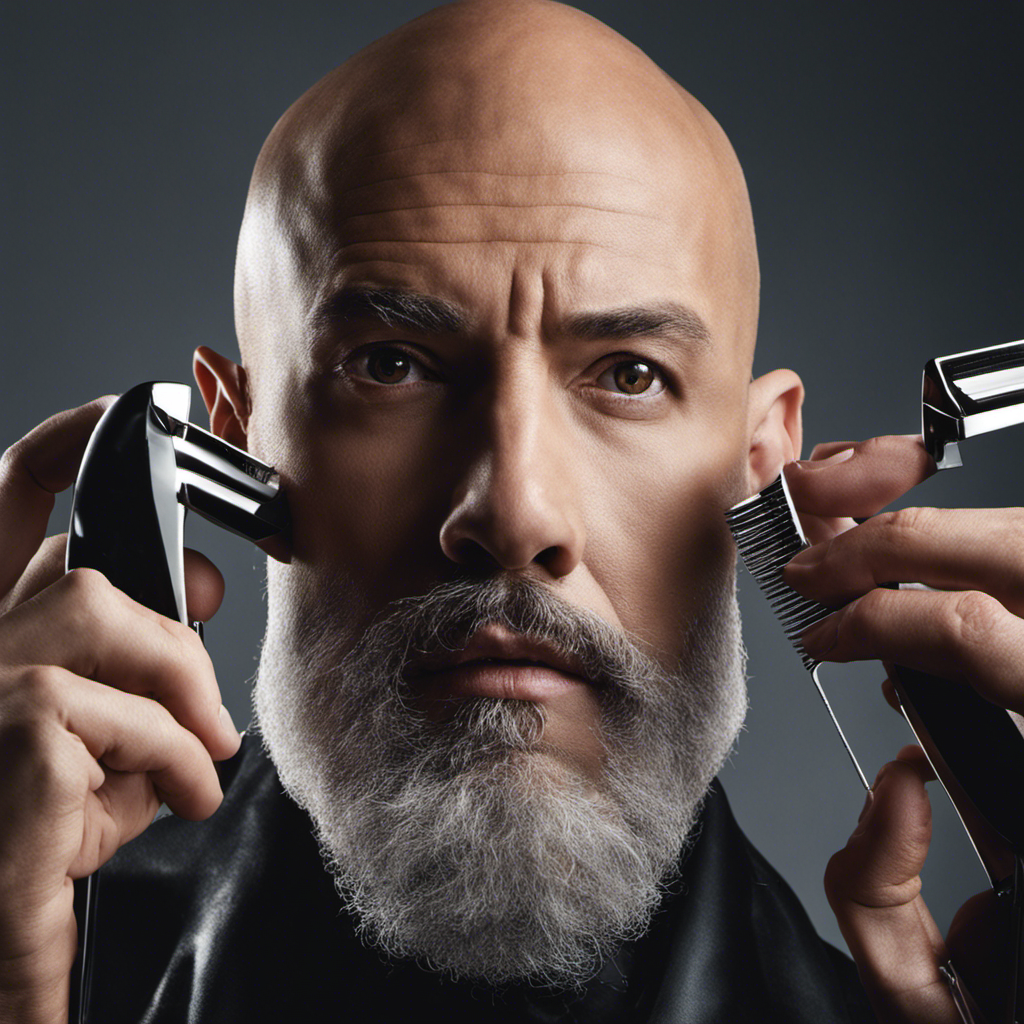
How can men like me achieve a smooth, hair-free look that offers an invigorating experience and boosts confidence?
In this article, I’ll guide you through the different methods, the right razor to choose, and how to prepare your scalp for the ultimate shave. We’ll tackle common challenges and explore alternative techniques, all while ensuring you maintain that sleek, bald head look.
So, get ready to embark on a journey to a perfectly shaved head!
Key Takeaways
- Electric razors and manual razors with a pivoting head are popular methods for shaving the head.
- Choosing the right razor with sharp blades and a comfortable handle grip is important for a smooth shave.
- Proper scalp preparation, including wetting the scalp with warm water and applying shaving cream or gel, is necessary for a smooth shave.
- Maintaining a bald head look involves hydrating the scalp, protecting it from UV rays, massaging the scalp, and preventing irritation and ingrown hairs.
Different Methods of Shaving the Head
There are various methods of shaving your head, depending on your personal preference and the desired outcome.
When it comes to alternative shaving techniques, one popular method is using an electric razor. This allows for a quick and convenient shave, with the added benefit of preventing razor burn. Electric razors are designed to cut the hair close to the scalp without causing irritation.
Another alternative technique is using a manual razor with a pivoting head. This allows for better control and smooth gliding over the contours of the head.
To prevent razor burn, it is important to prepare the skin properly by washing it with warm water and using a shaving cream or gel. Additionally, shaving in the direction of hair growth and using short, gentle strokes can help minimize irritation.
Choosing the Right Razor for a Smooth Shave
When it comes to choosing the right razor for a smooth shave, it’s important to consider factors like blade sharpness and handle grip. Here are three key factors to consider when selecting a razor that will prevent irritation and ingrown hairs:
-
Blade sharpness: Look for razors with sharp blades that can easily glide through the hair without tugging or pulling. Dull blades can cause friction and irritation on the scalp, leading to discomfort and potential ingrown hairs.
-
Handle grip: A razor with a comfortable and secure handle grip is crucial for a smooth shaving experience. It allows for better control and reduces the risk of accidental cuts or nicks.
-
Blade replacement: Opt for razors with easily replaceable blades. Regularly changing the blade ensures a sharp and clean shave, minimizing the chances of irritation and ingrown hairs.
By carefully considering these factors, you can choose a razor that will provide a smooth and irritation-free shave.
Now, let’s move on to preparing the scalp for shaving.
Preparing the Scalp for Shaving
Before starting the shave, it’s important to properly prepare the scalp for a smooth shaving experience. Taking care of your scalp not only ensures a comfortable shave but also promotes overall scalp health.
Here are some tips for scalp care before shaving.
First, wet your scalp with warm water to soften the hair and open up the pores.
Next, apply a moisturizing shaving cream or gel to create a smooth surface and prevent irritation.
Using a sharp razor, shave in the direction of hair growth to minimize the risk of ingrown hairs.
Lastly, rinse off any remaining shaving cream and pat your scalp dry.
Shaving the head has several benefits, including a clean and polished look, reduced maintenance, and the option to experiment with different hairstyles.
Step-By-Step Guide to Shaving the Head
To start shaving your head, begin by wetting your scalp with warm water to soften the hair and open up the pores. This step is crucial as it helps to prevent irritation and allows for a smoother shave.
Once your scalp is wet, you can choose the right technique that suits you best. Here are three options to consider:
-
Traditional Razor: This classic method involves using a sharp razor blade to remove the hair. It gives you a close shave and allows for precise control, but requires more time and effort.
-
Electric Shaver: This convenient option is quick and easy. It cuts the hair using oscillating blades or rotary heads. It’s ideal for those who prefer a low-maintenance approach and want to save time.
-
Clippers: Clippers are often used to trim hair, but they can also be used to shave the head. They offer a versatile option that allows you to adjust the length of the hair, giving you a customized look.
Shaving your head has several benefits, including a clean and polished appearance, reduced maintenance, and the ability to rock a bold style. So, choose the technique that suits you best and enjoy the benefits of a shaved head.
Dealing With Common Shaving Challenges
One of the most common challenges I face when shaving my head is razor burn, which can cause redness and irritation. To deal with razor bumps, I make sure to prepare my scalp properly before shaving.
First, I cleanse my head with a gentle exfoliating scrub to remove dead skin cells and unclog pores. This helps to prevent ingrown hairs and reduce the chances of razor bumps. Then, I apply a pre-shave oil to soften the hair and provide a smooth surface for the razor.
When it comes to preventing nicks and cuts, I always use a sharp blade and shave in the direction of hair growth. I also use a moisturizing shaving cream to create a barrier between the razor and my skin, reducing the risk of cuts.
Overall, following these steps helps me achieve a clean and smooth shave without any irritation or discomfort.
Maintaining a Bald Head Look
When maintaining a bald head look, it’s important to regularly moisturize the scalp to prevent dryness. Here are three essential tips for head shaving maintenance and bald head care:
-
Hydrate: Keeping the scalp hydrated is crucial to maintain a healthy bald head. Use a moisturizing shampoo specifically designed for bald heads to nourish and hydrate the scalp. This will help prevent dryness and flakiness.
-
Protect: Shield your scalp from harmful UV rays by wearing a hat or applying sunscreen. Exposing your bald head to the sun can cause sunburn and damage the skin. Choose a broad-spectrum sunscreen with SPF 30 or higher and apply it generously before heading outside.
-
Massage: Regularly massaging your scalp improves blood circulation, which promotes healthier hair growth. Use your fingertips to gently massage your scalp in circular motions for a few minutes each day. This not only feels relaxing but also helps distribute natural oils and maintain a balanced scalp.
Tips for Preventing Irritation and Ingrown Hairs
When it comes to shaving my head, I often find myself debating between using a razor or an electric shaver. Both have their pros and cons, so it’s important to consider factors such as skin sensitivity and desired level of closeness.
Additionally, I’ve learned that moisturizing after shaving is essential to keep my scalp hydrated and prevent irritation.
Razor or Electric
Guys often debate whether to use a razor or an electric device to shave their head. It’s a decision that can greatly impact the shaving experience and the end result. Here are the pros and cons of each option:
-
Razor:
- Pros: A razor provides a close, smooth shave that can last longer. It allows for precise control, especially when shaping facial hair or creating sharp lines. Plus, with the right technique, it can exfoliate the skin, leaving it feeling soft and refreshed.
- Cons: Shaving with a razor can be time-consuming, especially if you’re new to it. It requires careful handling to avoid cuts and nicks. Also, razor blades need to be replaced regularly, which can be an added expense.
-
Electric:
- Pros: An electric shaver offers convenience and speed. It requires minimal preparation, making it ideal for those with a busy lifestyle. It’s also generally safer, reducing the risk of cuts and irritation.
- Cons: Though electric shavers have improved over the years, they may not provide as close a shave as a razor. They can also be more expensive upfront. Additionally, some people find that electric shavers are louder and can cause more skin irritation.
Ultimately, the choice between a razor and an electric shaver comes down to personal preference and individual needs. It’s important to consider factors like skin sensitivity, desired shaving closeness, and time constraints.
Whichever option you choose, don’t forget to moisturize after shaving to soothe and hydrate your skin.
Moisturize After Shaving
After shaving your head, it’s important to moisturize the skin to keep it healthy and hydrated. Moisturizing can provide several benefits for your scalp and overall shaving experience. Not only does it help to prevent dryness and irritation, but it can also soothe any razor burn or redness that may occur.
To ensure your scalp stays moisturized, it’s recommended to use a moisturizer specifically designed for the head. These moisturizers are usually lightweight and non-greasy, allowing for quick absorption without leaving a residue. They often contain ingredients like aloe vera or chamomile, which have soothing properties.
Here are some head shaving tips for moisturizing:
| Tip | Description |
|---|---|
| 1. Choose the right moisturizer | Look for a moisturizer specifically designed for the head that suits your skin type. |
| 2. Apply after shaving | Gently apply the moisturizer to your freshly shaved scalp to lock in moisture. |
| 3. Use daily | Make moisturizing a part of your daily routine to maintain hydration and prevent dryness. |
Exploring Alternative Shaving Techniques for the Head
There are several different methods that can be used to shave your head. When it comes to alternative shaving techniques, it’s important to find the one that works best for you. Here are three options to consider:
-
Electric Shavers: These devices are convenient and offer a quick and efficient shave. They are especially helpful for those with sensitive skin or prone to irritation.
-
Wet Shaving with a Safety Razor: Although it requires more time and precision, wet shaving with a safety razor provides a close and smooth shave. It may take some practice to master the technique, but the results are worth it.
-
Head Blade: Designed specifically for head shaving, the Head Blade is a unique tool that offers excellent control and maneuverability. It simplifies the process and minimizes the risk of cuts or nicks.
Exploring alternative shaving techniques can help overcome head shaving challenges and ensure a comfortable and effective experience. Now, let’s address some frequently asked questions about head shaving.
Frequently Asked Questions About Head Shaving
When it comes to head shaving, finding the best technique is essential for achieving a smooth and clean look. In this discussion, I will explore the most effective head shaving techniques that have been recommended by experts and experienced individuals.
Additionally, I will provide a comprehensive list of recommended head shaving products that can help you achieve the best results and maintain a well-groomed appearance.
Best Head Shaving Techniques
One of the best head shaving techniques is to use a shaving cream or gel to help moisturize the scalp before shaving. This step is crucial for a smooth and comfortable shave.
Here are three reasons why this technique is beneficial:
-
Enhanced Comfort: Applying a shaving cream or gel creates a protective barrier between the razor and your scalp, reducing the risk of irritation and razor burn.
-
Hydration: Shaving cream or gel helps to lock in moisture, preventing dryness and flakiness on your bald head.
-
Improved Glide: The lubricating properties of shaving cream or gel allow the razor to glide effortlessly across the scalp, ensuring a close and precise shave.
Whether you prefer a razor or an electric shaver, using a shaving cream or gel beforehand will maximize the benefits of a bald head, leaving you with a smooth and polished look.
Recommended Head Shaving Products
Using a shaving cream or gel before shaving your head is essential for a smooth and comfortable experience. When it comes to bald head care, finding the right head shaving cream is crucial. Look for a cream specifically designed for head shaving, as it will provide the necessary lubrication and protection for your scalp.
These creams are often formulated with ingredients like aloe vera or vitamin E to soothe and moisturize your skin. Applying the cream evenly onto your head will create a barrier between the razor and your skin, reducing the risk of irritation or razor burn. Additionally, the cream will help soften your hair, making it easier to shave.
Frequently Asked Questions
How Long Does It Typically Take for Hair to Grow Back After Shaving the Head?
It typically takes a few weeks for hair to start growing back after shaving my head. To promote hair regrowth, I make sure to maintain a healthy diet, stay hydrated, and avoid excessive heat styling.
Is It Necessary to Use Shaving Cream or Gel When Shaving the Head?
When shaving my head, I find that using shaving cream or gel is not necessary. However, it can provide a smoother shave and minimize irritation. Some alternative products like hair conditioner or coconut oil can also work well.
Can Shaving the Head Cause Any Scalp or Skin Problems?
Shaving the head can sometimes lead to scalp or skin problems, such as irritation or ingrown hairs. However, practicing good scalp hygiene and using proper techniques, like exfoliating and moisturizing, can help prevent these issues and even stimulate hair growth.
Are There Any Specific Hair Care Products Recommended for Maintaining a Bald Head Look?
When it comes to maintaining a bald head look, using specific hair care products can be beneficial. These products are designed to keep the scalp moisturized and healthy, ensuring a smooth and polished appearance.
What Are Some Common Mistakes to Avoid When Shaving the Head for the First Time?
When shaving my head for the first time, I made some common mistakes. But with these tips for a smooth head shave, I learned to avoid them and achieve a polished look.
Conclusion
In conclusion, shaving your head can be a liberating experience. It allows you to embrace a bald head look and maintain a smooth and polished appearance.
By following the step-by-step guide and choosing the right razor, you can achieve a close shave without any irritation or ingrown hairs. Remember to properly prepare your scalp and address any common shaving challenges.
Whether you opt for traditional methods or explore alternative techniques, maintaining a bald head has never been easier.
So seize the opportunity to showcase your sleek and stylish self!
Lucy, with her knack for weaving words into compelling narratives, is a cherished member of our content team. Her journey into the world of content creation began with a love for storytelling, nurtured during evenings spent around campfires and family gatherings. These tales, filled with emotion and life lessons, left an indelible mark on her young mind, propelling her into the realm of writing.
Guides and Tutorials
How to Give Someone a Wet Shave to a Head
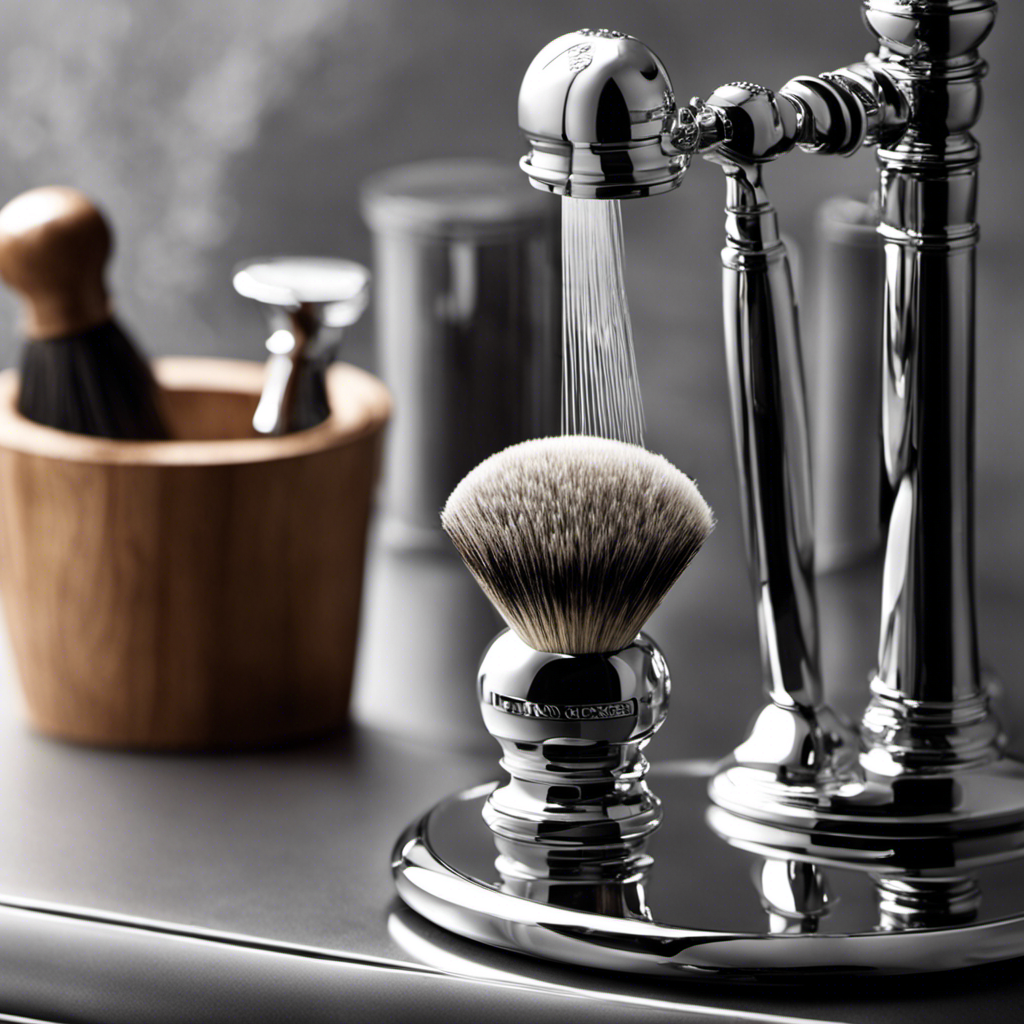
Are you interested in mastering the art of giving someone a wet shave for their head? You’re in luck because you’ve come to the right place.
In this article, I’ll guide you through the step-by-step process of achieving a smooth and comfortable shave that will leave your recipient feeling refreshed and confident.
From preparing the scalp to choosing the right tools and products, I’ll provide you with all the knowledge and techniques you need to become a shaving pro.
So, let’s dive in and unlock the secrets to a flawless wet shave for the head.
Key Takeaways
- Properly cleanse the scalp and exfoliate to prepare for a wet shave.
- Choose the right shaving tools and products for a personalized and comfortable experience.
- Use shaving creams and pre-shave oils to moisturize, protect, and soften the skin.
- Master the lathering technique and razor angle for effective hair removal without irritation.
Preparing the Scalp for a Wet Shave
Before starting the wet shave, it’s important to properly cleanse and exfoliate the scalp. Head preparation is crucial for a smooth and comfortable shave.
To begin, I recommend using a gentle cleanser to remove any dirt, oil, or product buildup from the scalp. This will ensure a clean surface for the razor to glide smoothly.
Next, exfoliation is key to remove dead skin cells and unclog the hair follicles. You can use a scalp scrub or a soft brush to gently massage the scalp in circular motions. This will promote blood circulation and help prevent ingrown hairs.
Remember to rinse thoroughly and pat dry before proceeding with the wet shave. Taking the time to care for the scalp before shaving will result in a more effective and enjoyable experience.
Choosing the Right Shaving Tools and Products
When it comes to achieving a smooth and comfortable shave, choosing the right shaving tools and products is essential.
Understanding the different types and features of razors allows for a personalized shaving experience that suits your needs and preferences.
Additionally, selecting the best shaving creams and incorporating pre-shave oils into your routine can enhance the overall quality of your shave by providing added lubrication and moisturization to the skin.
Razor Types and Features
There are different razor types and features to consider when giving someone a wet shave to their head. It is important to choose the right razor for the job to ensure a close and comfortable shave. Here are four key factors to consider:
-
Razor Blade Sharpness: The sharpness of the razor blade is crucial for achieving a smooth and precise shave. Dull blades can cause irritation and uneven cuts. Regularly check the sharpness of the blades and replace them as needed.
-
Number of Blades: Razors with multiple blades offer a closer shave as they can cut through more hair in one stroke. Look for razors with three or more blades for a smoother result.
-
Ergonomic Design: A razor with an ergonomic design ensures a comfortable grip and better control during the shaving process. Look for a razor with a non-slip handle and a balanced weight for easy maneuvering.
-
Easy Razor Maintenance: Choose a razor that is easy to clean and maintain. Some razors come with detachable heads or cartridges that can be easily replaced, making it convenient to keep the razor in good condition.
Best Shaving Creams
To achieve a smooth and comfortable shave, you should consider using the best shaving cream available. The right shaving cream can make a world of difference in your shaving experience. Not only does it provide lubrication and protection for your skin, but it also helps to soften your facial hair, making it easier to cut.
When choosing a shaving cream, it’s important to look for ingredients that are gentle on your skin and help to moisturize and nourish it. Some common ingredients found in high-quality shaving creams include aloe vera, shea butter, and coconut oil. These ingredients work together to hydrate your skin and prevent irritation.
Additionally, it’s important to learn proper shaving cream application techniques to ensure a close and comfortable shave. Here are some tips for applying shaving cream effectively:
- Wet your face with warm water to open up your pores and soften your facial hair.
- Dispense a small amount of shaving cream onto your fingertips or a shaving brush.
- Gently massage the shaving cream onto your face in circular motions, making sure to cover all areas that you plan to shave.
- Allow the shaving cream to sit on your face for a minute or two to further soften your facial hair.
- Begin shaving using a sharp razor, following the direction of hair growth and rinsing the blade frequently.
Pre-Shave Oils Benefits
For a more nourishing and moisturizing shaving experience, consider using pre-shave oils before applying your shaving cream. Pre-shave oils offer several benefits that can greatly enhance your shaving routine. Here are four reasons why you should incorporate pre-shave oils into your grooming regimen:
-
Exfoliating: Pre-shave oils help to exfoliate the skin, removing dead skin cells and unclogging pores. This leads to a smoother shave and reduces the chances of ingrown hairs.
-
Moisturizing: The oils in pre-shave oils deeply moisturize the skin, leaving it soft and supple. This helps to prevent dryness and irritation during and after shaving.
-
Lubrication: Pre-shave oils create a slick surface on the skin, allowing the razor to glide effortlessly. This minimizes friction and reduces the risk of nicks and cuts.
-
Reducing Irritation: The nourishing properties of pre-shave oils help to soothe and calm the skin, reducing redness and irritation caused by shaving.
Step-By-Step Guide to Lathering the Head
Once you’ve prepared the head for shaving, start by applying a generous amount of shaving cream to the scalp.
Lathering techniques are crucial in achieving a smooth and irritation-free shave. Begin by wetting your hands with warm water, then take a dollop of shaving cream and rub it between your palms to create a rich lather.
Gently massage the lather onto the scalp using circular motions, making sure to cover the entire shaved area. This helps to lift the hairs, making them easier to cut and reducing the risk of razor burn.
Take your time to evenly distribute the lather, ensuring that each hair is coated. Remember to reapply more shaving cream if needed to maintain a good lather throughout the shave.
Mastering the Art of Razor Technique
When it comes to achieving a close and comfortable shave, mastering the art of razor technique is crucial.
One key aspect is maintaining the proper razor angle to ensure effective hair removal without causing irritation.
Additionally, shaving against the grain can provide an even closer shave, but it requires caution and technique to prevent skin irritation.
Lastly, moisturizing post-shave is essential for soothing the skin, minimizing razor burn, and promoting overall skin health.
Proper Razor Angle
To achieve a proper razor angle, you need to hold the razor at a 30-degree angle to the skin. This is crucial for a close and comfortable shave while minimizing the risk of nicks and cuts. Here are some key points to keep in mind when it comes to maintaining the razor angle and preventing razor burn:
-
Inspect the razor: Regularly check the razor blade for any signs of rust, dullness, or damage. Replace the blade as needed to ensure a sharp and clean shave.
-
Prepare the skin: Before shaving, cleanse the skin with warm water to soften the hair and open up the pores. This will make it easier for the razor to glide smoothly over the skin.
-
Use light pressure: Apply gentle pressure to the razor, allowing the weight of the razor to do most of the work. Avoid pressing too hard, as this can lead to irritation and razor burn.
-
Shave in the direction of hair growth: Always shave in the direction of hair growth to minimize the risk of ingrown hairs and irritation. This will also help achieve a closer shave without causing unnecessary friction.
By following these razor maintenance tips and paying attention to the razor angle, you can prevent razor burn and achieve a smooth and comfortable shave.
Now, let’s move on to the next step: shaving against the grain.
Shaving Against Grain
For a closer shave, remember to apply light pressure when shaving against the grain to avoid irritation and ingrown hairs. Shaving against the grain can provide a smoother result, but it also increases the risk of razor bumps and skin irritation.
To minimize these issues, it is important to follow proper shaving techniques and take preventive measures. Here are some tips to help you achieve a smooth shave while preventing razor bumps:
-
Use a sharp blade: A dull blade can cause more friction and increase the chances of irritation. Replace your blade regularly to ensure a clean and sharp shave.
-
Prep your skin: Before shaving, cleanse your skin with warm water and a gentle cleanser to remove any dirt or oils. This will soften the hair and make it easier to shave.
-
Moisturize: After shaving, apply a soothing moisturizer to hydrate your skin and reduce any post-shave irritation.
Moisturizing Post-Shave
Applying a soothing moisturizer after shaving helps to hydrate the skin and reduce post-shave irritation. Moisturizing techniques play a crucial role in preventing razor burn and maintaining a healthy complexion. Here are four essential tips for effective post-shave moisturizing:
-
Choose the right moisturizer: Look for a product specifically formulated for post-shave use. It should be lightweight, non-greasy, and contain ingredients like aloe vera or chamomile to soothe and calm the skin.
-
Apply immediately: After shaving, pat the skin dry with a clean towel and apply the moisturizer while the skin is still slightly damp. This helps to lock in moisture and enhance absorption.
-
Use gentle, upward strokes: Massage the moisturizer into the skin using gentle upward movements. This promotes blood circulation and aids in the absorption of the product.
-
Don’t forget the neck: Extend the moisturizer application to the neck area, as it is often prone to irritation and razor burn. Ensure thorough coverage for a well-moisturized and smooth finish.
Navigating Tricky Areas on the Head
When shaving your head, it can be challenging to navigate tricky areas like the back of your head and behind the ears. These areas are prone to nicks and cuts, as well as razor burn if not handled properly. To avoid these issues, it is important to approach these areas with caution and precision.
When shaving the back of your head, use a handheld mirror or ask for assistance to ensure you can see what you’re doing.
For the areas behind the ears, gently pull the earlobe to make the skin taut and shave carefully, using short, controlled strokes.
Tips for a Smooth and Comfortable Shave
To achieve a smooth and comfortable shave, it’s important to approach tricky areas with caution and precision. Here are some tips to help prevent razor burn and reduce ingrown hairs:
-
Prepare your skin: Before shaving, make sure to cleanse your skin with a gentle cleanser to remove any dirt or oils. This will help soften the hair and open up the pores, making it easier to get a close shave.
-
Use a sharp razor: Using a dull razor can increase the risk of razor burn and ingrown hairs. Make sure to use a sharp razor and replace the blades regularly to ensure a clean and smooth shave.
-
Shave with the grain: Shaving against the direction of hair growth can cause irritation and ingrown hairs. Instead, shave in the direction that the hair naturally grows to reduce the risk of razor burn and ingrown hairs.
-
Moisturize after shaving: After you’ve finished shaving, apply a moisturizer or aftershave lotion to soothe the skin and keep it hydrated. This will help prevent razor burn and promote healthy skin.
Aftercare for a Freshly Shaved Head
Take a few minutes to gently massage a moisturizing lotion into your freshly shaved scalp to keep it hydrated and prevent any dryness or irritation. After a wet shave, your scalp may feel sensitive and in need of some extra care. A scalp care routine is essential to maintain its health and appearance. Here is a simple three-step routine that you can follow:
| Step | Action | Product |
|---|---|---|
| 1 | Clean | Use a gentle cleanser specifically designed for the scalp to remove any dirt or excess oil. |
| 2 | Moisturize | Apply a moisturizing lotion or oil to nourish and hydrate the scalp. Look for products that contain ingredients like aloe vera or shea butter. |
| 3 | Protect | After moisturizing, don’t forget to apply sunscreen to your freshly shaved head to protect it from harmful UV rays. Choose a broad-spectrum sunscreen with at least SPF 30. |
Following this scalp care routine will help keep your freshly shaved head healthy, hydrated, and protected from the sun.
Troubleshooting Common Shaving Problems
If you experience any common shaving problems, such as razor burn or ingrown hairs, there are a few simple solutions you can try. Here are four effective ways to troubleshoot razor burn and prevent ingrown hairs:
-
Use a sharp razor blade: Dull blades can cause irritation and increase the likelihood of razor burn. Replace your blade regularly to ensure a clean and smooth shave.
-
Prep your skin properly: Before shaving, make sure to cleanse your skin and soften the hair with warm water. This will help minimize irritation and make the shaving process easier.
-
Apply a shaving cream or gel: Using a high-quality shaving cream or gel creates a protective barrier between the razor and your skin. This reduces friction and helps prevent razor burn.
-
Follow the grain: Shave in the direction of hair growth to prevent ingrown hairs. Going against the grain can cause the hair to curl back into the skin, leading to painful ingrown hairs.
Frequently Asked Questions
How Long Does It Take for Hair to Grow Back After a Wet Shave?
Hair growth after a wet shave varies, but typically it takes about 1-2 weeks to see noticeable regrowth. To promote faster hair growth, try moisturizing the scalp, eating a balanced diet, and avoiding excessive heat styling.
Can I Use Regular Shaving Cream or Do I Need a Specific Product for a Wet Shave?
I prefer using a specific product for wet shaving on the head because it provides better lubrication and protection against irritation. Alternatives like shaving cream can work, but they may not offer the same level of comfort and effectiveness.
Is It Necessary to Exfoliate the Scalp Before a Wet Shave?
Exfoliating the scalp before a wet shave is not necessary, but it can be beneficial. It helps remove dead skin cells, allowing for a smoother shave. Using a pre-shave oil can also provide added protection and lubrication for a comfortable shave.
Are There Any Specific Techniques to Prevent Razor Bumps or Ingrown Hairs on the Head?
To prevent razor bumps and ingrown hairs on the head, it’s crucial to follow best practices and aftercare tips. By using proper shaving techniques, moisturizing the skin, and regularly exfoliating, you can minimize these issues.
Can I Use an Electric Razor for a Wet Shave on the Head?
Yes, you can use an electric razor for a wet shave on the head. Electric razors have the advantage of being quick and convenient. However, a wet shave with a manual razor provides a closer and smoother shave.
Conclusion
Well, there you have it, folks. The ultimate guide to giving someone a wet shave to the head. Armed with the right tools, techniques, and a little bit of patience, you can transform any noggin into a smooth and shiny masterpiece.
Just remember to lather up, master the art of razor technique, and navigate those tricky areas with finesse.
And if all else fails, don’t worry, we’ve got some troubleshooting tips for you too.
So go forth and shave with confidence, my friends. Your head will thank you.
Lucy, with her knack for weaving words into compelling narratives, is a cherished member of our content team. Her journey into the world of content creation began with a love for storytelling, nurtured during evenings spent around campfires and family gatherings. These tales, filled with emotion and life lessons, left an indelible mark on her young mind, propelling her into the realm of writing.
Guides and Tutorials
Howie Mandel Why Did He Shave His Head
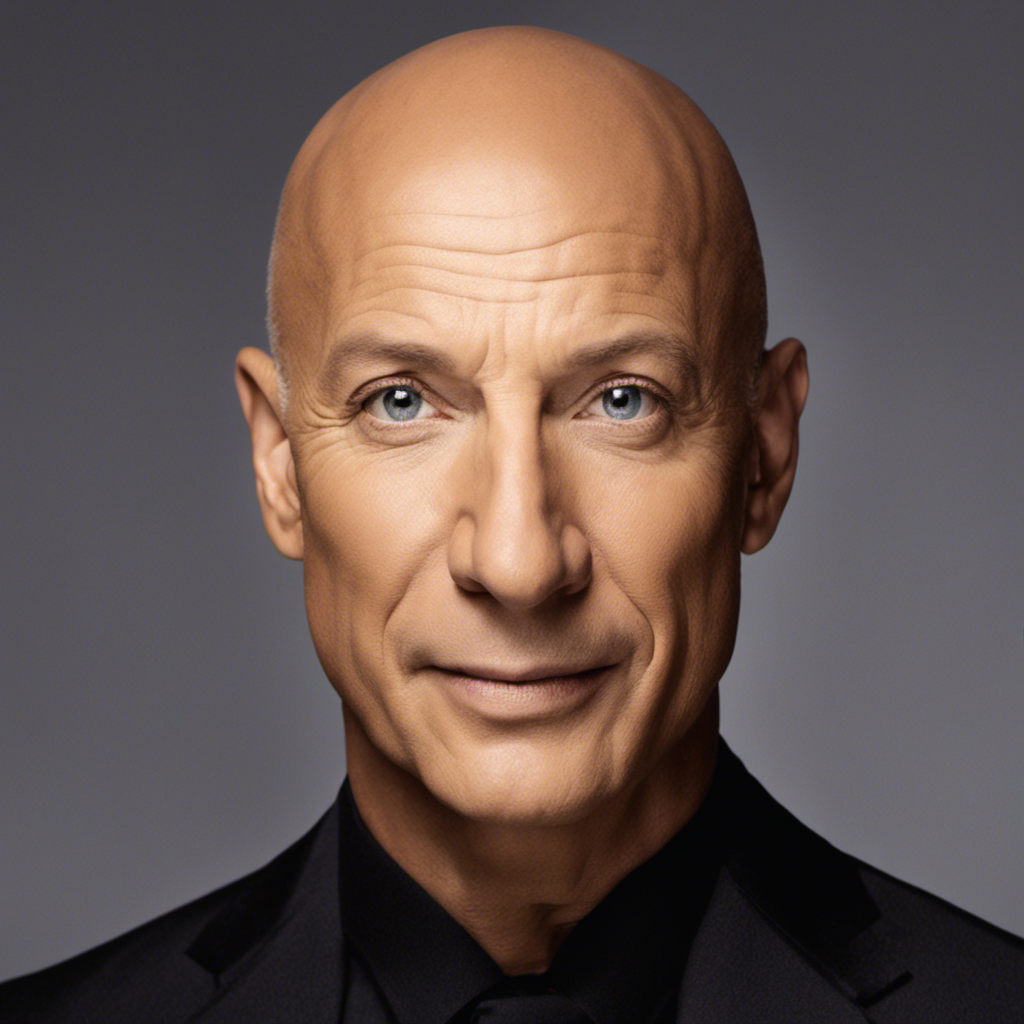
Curious about why Howie Mandel decided to shave his head? Let me give you the inside story.
The iconic comedian and TV personality recently made a daring move, shaving off his luscious locks. But what made him take the plunge?
In this article, we’ll delve into the fascinating journey of Howie’s new look and explore the reasons behind his decision. From hair loss concerns to personal style evolution, we’ll uncover the truth behind this buzzworthy transformation.
Get ready, because it’s time to uncover the secrets behind Howie Mandel’s shiny new dome.
Key Takeaways
- Howie Mandel embraced the bald look to stay in line with Hollywood trends and to assert his individuality.
- His decision to go bald showcases his willingness to embrace change and challenges societal beauty standards.
- Going bald can be both stylish and practical, especially for those seeking a low-maintenance hairstyle.
- Howie Mandel’s decision to shave his head has received overwhelming support and positive reception from the public.
The Decision to Shave
Why did Howie Mandel decide to shave his head?
The bald look is all the rage in Hollywood, and it seems like Howie didn’t want to be left behind. The beloved comedian and television host recently made the bold decision to embrace change and go for a completely bald look.
But what prompted this dramatic transformation? Rumors have been swirling that Howie wanted a fresh start, a new image that would set him apart from the crowd. Some say he was tired of the constant maintenance of his signature hairstyle, while others speculate that it was a personal decision, a way for him to assert his individuality.
Whatever the reason, Howie Mandel is rocking the bald look like a true trendsetter, proving once again that change can be a beautiful thing.
Howie’s New Look
Oh, the buzz around Howie Mandel’s new look is sending shockwaves through Hollywood! The beloved comedian and TV personality has ditched his signature hairdo and gone completely bald.
But is this a bold fashion statement or a practical choice? Let’s dive into the juicy details and explore whether Howie’s new look is a stylish triumph or a practical makeover.
Bald or Bold
You should embrace your baldness like Howie Mandel did – it’s a bold and confident look!
In a world obsessed with luscious locks and flowing manes, it’s refreshing to see someone break free from the societal beauty standards. Howie, known for his quick wit and infectious laughter, decided to ditch the hair and embrace his baldness. And let me tell you, he looks better than ever!
Gone are the days of hiding under caps or struggling with hair loss treatments. Howie’s decision to embrace his baldness has challenged the stigma of baldness and shown us that true confidence comes from within.
Stylish or Practical?
If you’re looking for a low-maintenance hairstyle, going bald can be both stylish and practical. Just ask the legendary Howie Mandel, who recently made headlines when he shaved off his signature locks. But what led this funnyman to take the plunge? Rumor has it that Mandel was tired of dealing with the hassle of styling his thinning hair. And who can blame him?
In a world obsessed with perfect coifs and luscious locks, societal expectations can be tough to meet. But Mandel’s decision to embrace his baldness is a lesson in self-confidence and authenticity. For those facing hair loss, there are various solutions available, from hair transplants to stylish wigs.
Hair Loss Concerns
Are you starting to notice a few more strands in the shower drain? Don’t panic, because I’ve got the inside scoop on coping with baldness and the latest hair loss treatment options.
From Hollywood heartthrobs to everyday folks, hair loss is a universal concern that can really knock our confidence. But fear not, because I’ve got the lowdown on how to embrace your new look or explore the exciting world of hair restoration.
Coping With Baldness
Don’t worry, there are many ways to cope with baldness. Whether you’re a Hollywood heartthrob or an everyday Joe, baldness acceptance and self-esteem impact everyone. Just ask Howie Mandel, the famous comedian and TV host known for his clean-shaven head. Rumor has it that Howie decided to embrace his baldness after years of battling hair loss. And let me tell you, he’s never looked better! But Howie is not alone in his journey. Many other celebrities and regular folks have also found ways to cope with their thinning locks. Check out this handy table for some inspiration:
| Celebrity | Coping Method |
|---|---|
| Dwayne Johnson | Rocking the bald look |
| Jason Statham | Sporting a buzz cut |
| Patrick Stewart | Embracing the chrome dome |
| Vin Diesel | Going completely bald |
Hair Loss Treatment Options
Looking to address hair loss? Don’t worry, I’ve got the inside scoop on how to combat that receding hairline or thinning crown. There are several treatment options available to you. Check out these four hair loss treatment options that are making waves in Hollywood:
-
Hair loss prevention: Stop the shedding before it even starts! From specialized shampoos to vitamin supplements, there are plenty of products on the market claiming to prevent hair loss. Keep your locks luscious with these preventative measures.
-
Hair transplant surgery: If your hairline has already done a disappearing act, fear not! Celebrities like Wayne Rooney and Elon Musk have turned to hair transplant surgery to restore their former glory. This surgical procedure involves taking hair follicles from one area of the body and transplanting them to the balding areas. Voila, a full head of hair!
-
PRP therapy: Platelet-Rich Plasma therapy is gaining popularity among the A-listers. This non-surgical treatment stimulates hair growth by injecting your own plasma into the scalp. It’s like giving your hair a shot of youth!
-
Laser therapy: Zap away hair loss with the power of lasers! Low-level laser therapy has been shown to stimulate hair follicles and promote regrowth. It’s a painless and convenient option for those looking to turn back the clock on their thinning tresses.
Personal Style Evolution
You may wonder why Howie Mandel decided to shave his head and how it reflects his personal style evolution. Well, let me tell you, it’s all about staying ahead of the game in the ever-changing world of celebrity trends. Howie, known for his iconic bald look, has embraced his hair transformation as a way to showcase his bold and confident style.
To better understand the impact of his decision, let’s take a look at this table:
| Before | During | After |
|---|---|---|
| Wild curls | Receding hairline | Clean-shaven |
Before, Howie rocked wild curls that were full of personality. But as time went on, he noticed his hairline receding. Instead of fighting it, he made the daring choice to shave it all off. And boy, did it pay off! The clean-shaven look suits him perfectly and has become his signature style.
The Influence of COVID-19
The influence of COVID-19 has led to significant changes in the world of celebrity trends. From the red carpet to the streets, our favorite stars are adapting to the ‘new normal’ and embracing a more casual and relatable style. Here’s how the pandemic has affected celebrity fashion:
-
Comfort is king: Gone are the days of sky-high heels and restrictive outfits. Celebrities are opting for cozy loungewear and athleisure, prioritizing comfort over glamour.
-
Virtual fashion shows: With traditional fashion shows on hold, designers are turning to digital platforms to showcase their collections. Celebrities are attending these virtual events, setting trends with their Zoom-worthy ensembles.
-
DIY fashion: With more time at home, celebrities are exploring their creative sides and experimenting with DIY fashion. From tie-dye to embroidery, they’re customizing their clothes and making fashion statements from the comfort of their living rooms.
-
Embracing imperfections: The pandemic has sparked conversations about insecurity issues and societal expectations. Celebrities are using their platforms to promote body positivity and self-acceptance, encouraging fans to embrace their flaws and celebrate their uniqueness.
In this ever-changing world, celebrities are showing us that fashion is not just about looking good, but also about feeling good and staying true to oneself. So, let’s raise a glass to the stars who are using their influence for good and inspiring us to embrace our own personal style, imperfections and all.
Confidence Boost
Feeling confident in your own skin is key to embracing your personal style, imperfections and all.
And when it comes to personal transformation, there’s no better example than Howie Mandel’s recent decision to shave his head. The iconic comedian and TV personality, known for his signature curly hair, made the bold move to embrace a new look.
But it wasn’t just about a change in appearance; it was a statement of self-esteem. Mandel’s decision to go bald was a testament to his confidence and willingness to embrace his true self. In a world where society often dictates beauty standards, his move was a powerful reminder that true beauty comes from within.
It’s a lesson we can all learn from, as we navigate our own personal journeys and strive to embrace our authentic selves.
Public Reaction and Support
Witnessing the public’s overwhelming support for his new bald look must have been incredibly uplifting for Howie Mandel. After shaving his signature hair on a whim, the comedian took the internet by storm. Public opinion erupted, and social media platforms were flooded with reactions to his daring new style.
Here are four key highlights from the social media response:
-
The Bald Brotherhood: Fans praised Mandel’s decision, hailing him as a brave member of the Bald Brotherhood. They admired his confidence and saw it as a symbol of self-acceptance.
-
Memes Galore: Social media exploded with hilarious memes featuring Mandel’s bald head. From photoshopped images to clever captions, the internet had a field day, showcasing its creativity and wit.
-
Fashion Forward: Many applauded Mandel’s bald look for being edgy and stylish. They saw it as a fashion statement, proving that confidence can be the best accessory.
-
Supportive Messages: Fans and celebrities alike flooded Mandel’s social media accounts with supportive messages. They praised his courage and sent love, reminding him that he is not alone in his hairless journey.
The public’s overwhelming support and positive reception have undoubtedly boosted Mandel’s spirits, showing that sometimes, a simple change can have a profound impact.
Frequently Asked Questions
Does Howie Mandel’s Decision to Shave His Head Have Any Connection to His Career or Upcoming Projects?
Howie Mandel’s bald look has sparked curiosity among fans. The public reaction to his shaved head ranges from admiration for his bold style to speculation about upcoming projects. Let’s dig into the buzz!
How Long Did It Take for Howie to Adjust to His New Bald Look?
It took me some time to fully embrace my new bald look, but now I’m rocking it with confidence! Fans are loving the trend, and I’m enjoying this journey of self-acceptance.
Did Howie Consult With Any Experts or Professionals Before Deciding to Shave His Head?
Before deciding to shave his head, Howie Mandel did extensive research and consulted with hair care experts. He wanted to make sure he was making the right decision for his look and personal style.
Has Howie Mandel Ever Experienced Hair Loss in the Past?
Yes, Howie Mandel has experienced hair loss in the past, which led to his decision to shave his head. While there are various causes for hair loss, there are also treatments available to address this issue.
How Has Howie’s Family and Close Friends Reacted to His Decision to Shave His Head?
How has Howie’s family and close friends reacted to his decision to shave his head? Well, let me tell you, they were initially shocked, but now they can’t stop praising his bold new look! It’s a total head-turner!
Conclusion
Howie Mandel’s bold bald move has left fans buzzing! The decision to shave his head was not only a personal style evolution, but also a confidence boost for the beloved comedian. Amidst concerns about hair loss and the influence of COVID-19, Mandel embraced his new look with gusto.
And let’s not forget the public’s reaction and support, which has been overwhelmingly positive. Howie’s head-turning transformation has truly captivated audiences, making him the talk of the town.
So, why did he shave his head? The answer is clear: Mandel’s fearless choice has made him a true trendsetter in the entertainment industry.
Lucy, with her knack for weaving words into compelling narratives, is a cherished member of our content team. Her journey into the world of content creation began with a love for storytelling, nurtured during evenings spent around campfires and family gatherings. These tales, filled with emotion and life lessons, left an indelible mark on her young mind, propelling her into the realm of writing.
-

 Guides and Tutorials3 months ago
Guides and Tutorials3 months agoHow to Shave Head at Home
-

 Community and Stories2 months ago
Community and Stories2 months agoWhy Did Britney Shave Her Head
-

 Guides and Tutorials3 months ago
Guides and Tutorials3 months agoHow to Shave Half Your Head at Home
-
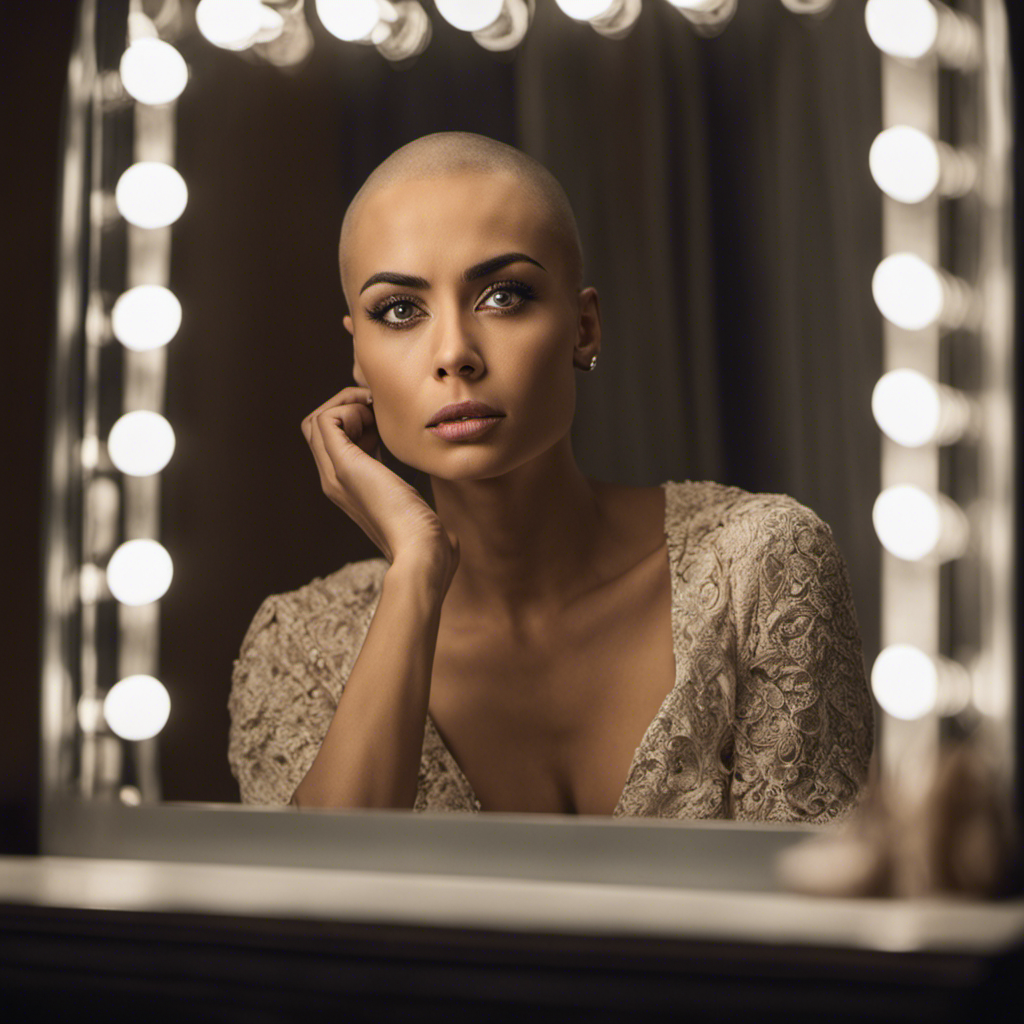
 Community and Stories2 months ago
Community and Stories2 months agoWhy Did Daph Shave Her Head
-

 Community and Stories3 months ago
Community and Stories3 months agoWhy Did Amanda Geise Shave Head
-
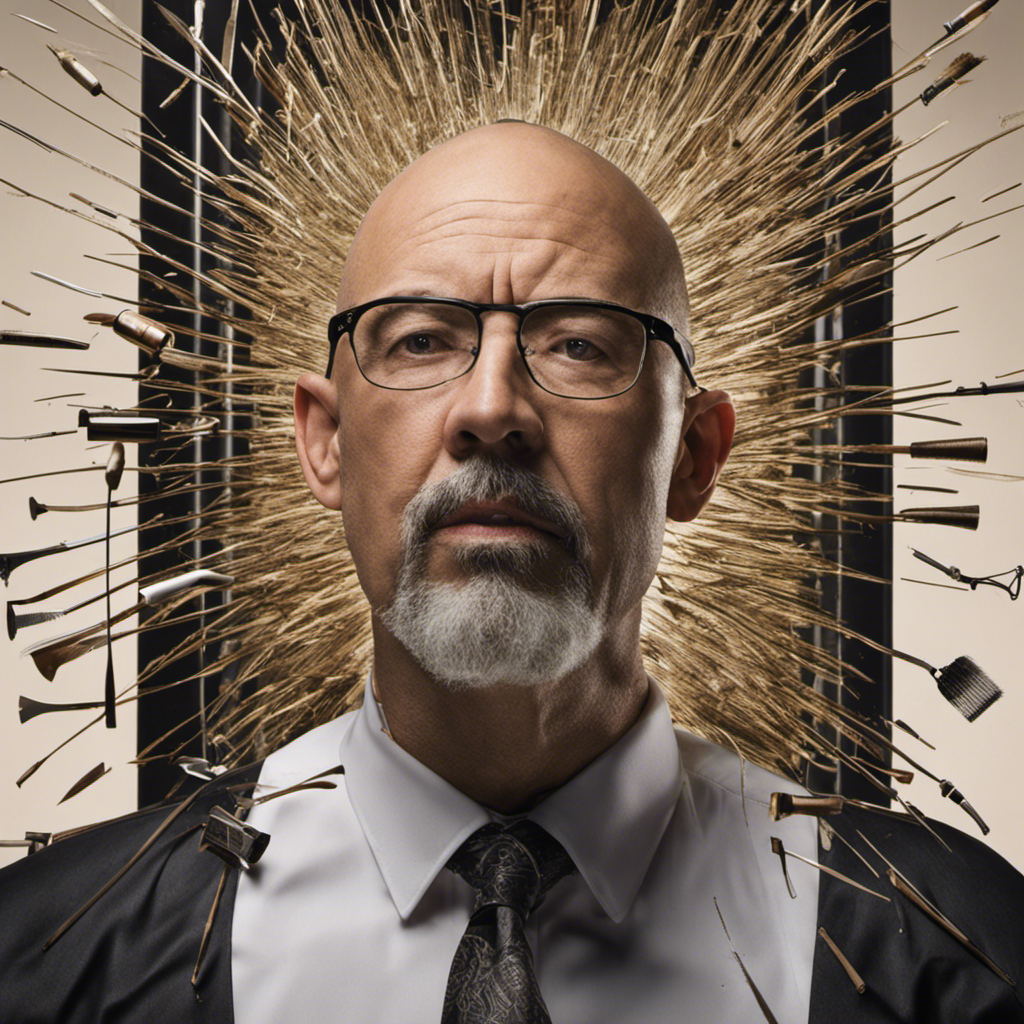
 Community and Stories2 months ago
Community and Stories2 months agoWhy Did Pat Shave His Head
-

 Community and Stories2 months ago
Community and Stories2 months agoWhy Did Bloodynine Shave His Head
-
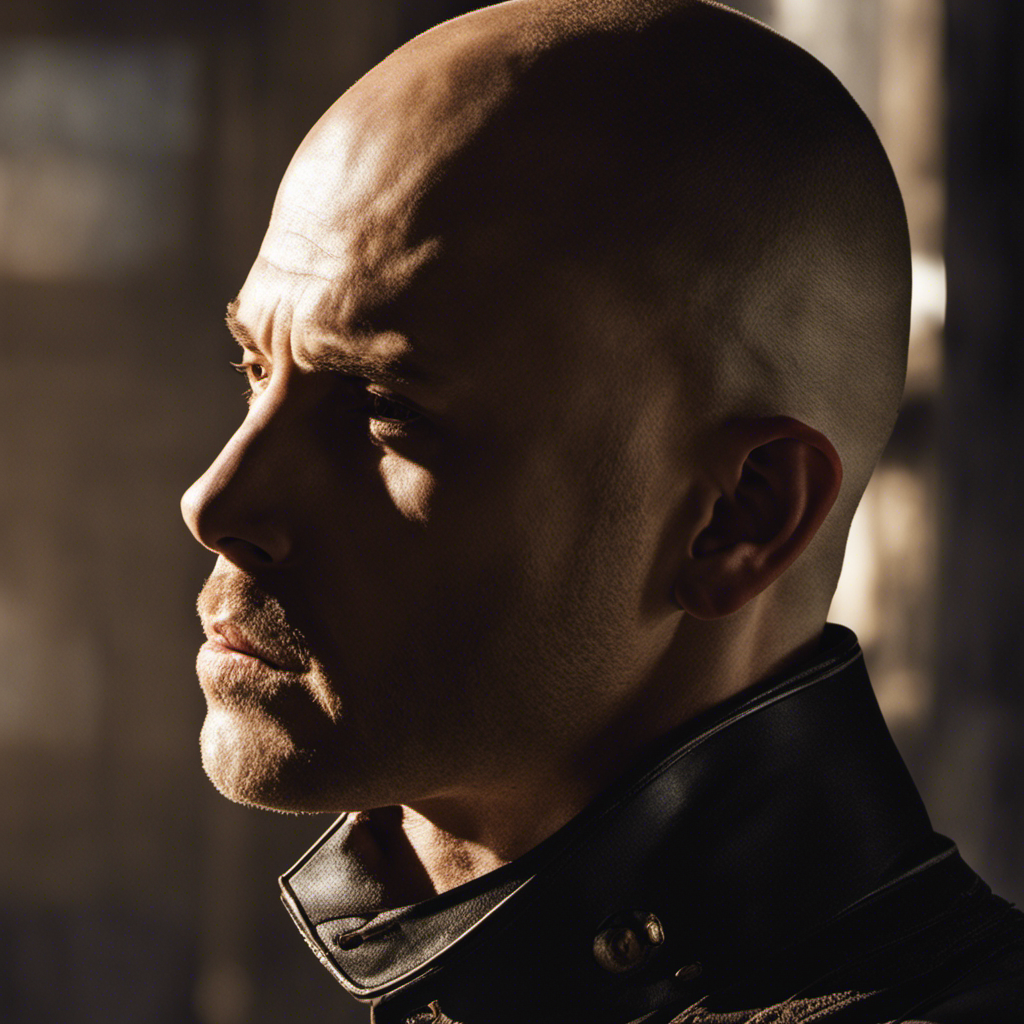
 Community and Stories3 weeks ago
Community and Stories3 weeks agoWhy Did Porter on Ghost Asylum Shave His Head









